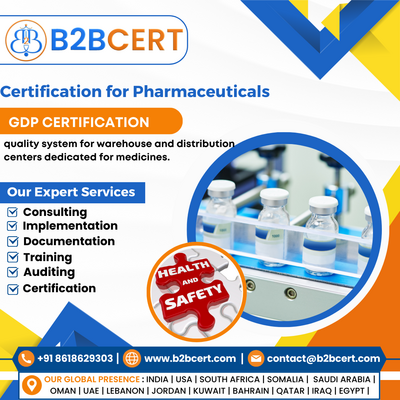What is Your Approach to Quality Risk Management?
-
In today's increasingly regulated pharmaceutical and healthcare landscape, ensuring the quality and integrity of products throughout the supply chain is non-negotiable. For businesses operating in New York, integrating a strong quality risk management (QRM) framework within distribution operations is crucial. It supports compliance with regulatory standards and builds trust with stakeholders. One of the most effective ways to formalize and improve QRM is through GDP Certification in New York.
Understanding Quality Risk Management in Distribution
Quality Risk Management (QRM) refers to a systematic process for the assessment, control, communication, and review of risks to the quality of pharmaceutical products. Within distribution operations, QRM ensures that the conditions under which medicinal products are stored and transported do not compromise their quality.
GDP (Good Distribution Practice) guidelines require that all activities related to distribution—including storage, transportation, documentation, and personnel practices—adhere to quality standards that mitigate risks effectively.
Key Elements of a Quality Risk Management Approach
To effectively manage quality risks in distribution, organizations should focus on the following areas:
1. Risk Assessment
The first step involves identifying potential hazards that could affect product quality during storage and transportation. This includes risks such as temperature excursions, contamination, mislabeling, and improper handling. A detailed risk analysis helps in prioritizing issues based on their impact and likelihood.
2. Preventive Controls
Once risks are identified, preventive controls must be implemented. This may include the use of temperature-controlled vehicles, tamper-evident packaging, strict handling protocols, and regular calibration of equipment. Having a comprehensive Standard Operating Procedure (SOP) for each activity is essential.
3. Monitoring and Review
Continuous monitoring of critical control points helps ensure the effectiveness of risk management strategies. Using data loggers, GPS tracking, and automated alerts can provide real-time visibility into your distribution processes. Regular audits and reviews ensure ongoing compliance and improvement.
4. Training and Competency
Employees involved in distribution must be adequately trained on QRM principles and GDP guidelines. Partnering with experienced GDP Consultants in New York can help tailor training programs to specific operational needs and regulatory expectations.
5. Documentation and Traceability
Maintaining accurate records of all distribution activities is not only a regulatory requirement but also an important part of QRM. Documentation helps trace the origin of issues and provides evidence of compliance during inspections or audits.
The Role of GDP Certification in Enhancing Quality Risk Management
Achieving GDP Certification in New York demonstrates that your organization adheres to global standards for pharmaceutical distribution. It validates that your QRM processes are effective and that your distribution network ensures product integrity, from the point of manufacture to the end user.
GDP Certification covers critical aspects such as:
-
Facility and storage conditions
-
Transportation management
-
Documentation and record-keeping
-
Training and personnel competency
-
Quality management systems
Working with GDP Consultants in New York can streamline the certification process and ensure that your QRM strategies are aligned with regulatory expectations.
Partnering with Experts for Better Outcomes
If your organization is looking to enhance its distribution practices, seeking professional GDP Services in New York can be a valuable investment. From gap analysis and risk assessment to training and audit preparation, consultants offer end-to-end support in achieving and maintaining GDP compliance.
Conclusion
A robust approach to quality risk management is essential to safeguarding the quality and safety of pharmaceutical products during distribution. By aligning your practices with GDP guidelines and leveraging expert support from GDP Consultants in New York, your organization can not only achieve compliance but also build a resilient and trustworthy supply chain. Explore certified GDP Services in New York to strengthen your QRM framework and ensure long-term operational excellence.
-





